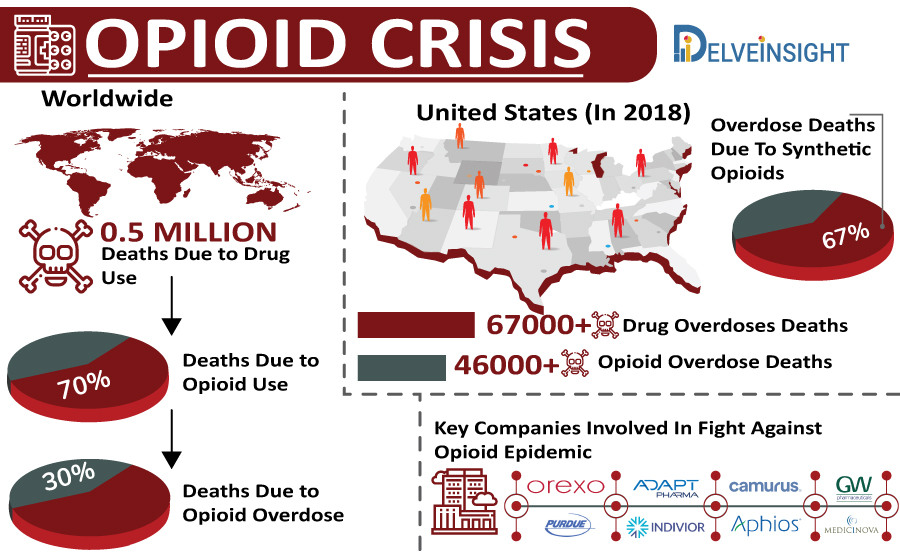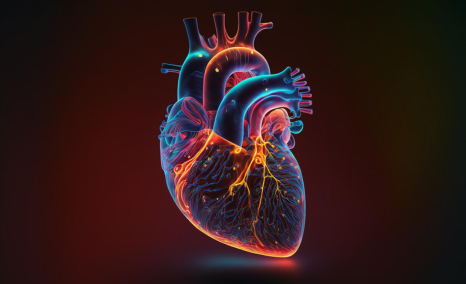How do we curb the Opioid Epidemic?
Oct 07, 2020
Opioid overdose is a severe health problem. As per the WHO, worldwide, around 0.5 million deaths are attributable to drug use. More than 70% of these deaths are related to opioids, with more than 30% of those deaths caused by overdose. Considered as a safe option to relieve pain, the Opiates have been in use for the last 50-60 years. Opioid is often sold illegally in the market and also has been used for euphoric effects. Over the past years, there has been a huge spike in opioid abuse especially in countries such as the United States, UK, Afghanistan, Iran, and Russia. As per the CDC, in the United States, although the number of drug overdose deaths decreased by 4% from 2017 to 2018, however, the number of drug overdose deaths was still four times higher in 2018 than in 1999. Nearly 70% of the total 67,367 deaths in 2018 involved an opioid.
Opioid Overdose Signs, Symptoms, and Risk Factors
The symptom of opioid overdose depends upon the level of opioid taken by the individual. Opioid overdose mainly affects the central nervous system and causes respiratory depression. Some other symptoms include extreme fatigue, loss of alertness, inability to talk, sedation, small or constricted pupils, a change in sleeping and eating habits, etc. In some cases, severe injuries and death may also occur.
Apart from the severe negative influence on the health condition of the users, opioid overdose has led to many social and economical impacts across nations worldwide. Opioid overdose can be linked with unemployment, poverty, family history of substance abuse and age of individuals, as these are the major risk factors for opioid misuse and addiction. Countries with high Opioid overdose also experience a burden on their healthcare system along with an increase in overdose-related fatalities, and criminal & unlawful activities.
Downloads
Article in PDF
Recent Articles
Also, Opioid prescription after surgery, to deal with Neuropsychiatric disorders and depression, certain medical conditions such as sleep apnea and liver function, intake of excessive opioid medicine can also cause opioid overdose.
Opioid Withdrawal Symptoms
The intoxication or Opioid Withdrawal Symptoms depends upon the Opioid dependency that the person has. Various treatments and strategies are available to overcome opioid addiction. Mainly group therapy, individual counseling, and the use of over-the-counter pain medications are considered for tackling Opioid withdrawal symptoms. The Opioid withdrawal symptoms are uncomfortable and non-life-threatening. In the initial stages, the opioid withdrawal symptoms lead to anxiety and craving for drugs. Other symptoms such as diarrhoea, nausea, vomiting, piloerection, and lacrimation may also occur. However, these symptoms are not serious and short-lived.

Worldwide, some of the key players such as Purdue Pharma, Orexo, Indivior Inc, Adapt Pharma, Indivior Inc., Aphios, Camurus, GW Pharmaceuticals, MediciNova, and others are developing therapies to tackle the Opioid epidemic due to dependency, overdose, and addiction. In April 2019, the U.S. The Food and Drug Administration (FDA) has approved the first generic Naloxone hydrochloride nasal spray (commonly known as Narcan) to treat opioid overdose. Naloxone, an opioid antagonist blocks or reverses the effects of opioid drugs. Naloxone (Narcan) can cause side effects. Opioid withdrawal being the major one. Apart from OWS, the other side effects are nausea, dizziness, restlessness, chills, fever, and many others. Several countries worldwide have started prescribing naloxone for opioid overdose.
Opioid abuse over the years has become a national crisis for many countries, especially in the United States. The opioid crisis has led to many challenges to the government and health agencies. Opioids are prescribed for relieving chronic pain, however the long term use of opioids, makes the body remain dependent on it. Opioid dependence treatment uses a set of pharmacological and psychosocial interventions that seek to reduce or cease opioid use and inhibit the harms associated with opioid use.
Opioid Overdose Preventions
- Monitoring opioid prescription – Opioids are considered a safe treatment option for limited use for pain that follows surgery, bone fracture, or other such medical conditions. However, for chronic pain or long-term treatment, the opioid prescription should be avoided. It may lead to addiction. In chronic pain, less-addictive pain medications should be the foremost options.
- Education and Training – Imparting training and education to the healthcare professionals can also be a significant step in reducing opioid overdose. Healthcare professionals directly interact with patients, and they can further monitor and educate the patients about the safe use of prescribed opioids.
- Safe storage and disposal of opioids – The opioids should be stored out of reach from teenagers and young adults. The patients are needed to provide counselling about proper storage and disposal of unused Opioids.
Combating opioid abuse is a serious challenge for any country. World health bodies such as WHO are regularly monitoring and recommending effective methods to minimize the risk of opioid misuse. Similarly, at the national level, governments are enacting laws and regulations for opioid overdose prevention. Apart from these local communities and NGOs are also making their efforts to raise awareness among the public (especially the youth) about the significant risk of opioid overdose and the chance of death and injuries associated with it.
Downloads
Article in PDF



